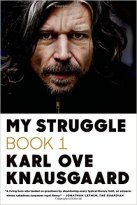Writers such as Philip Roth and more recently Will Self have predicted the death of the novel and have written its obituary notice with Roth declaring that he “was finished with fiction” and that in a few decades the novel will be as irrelevant as Latin poetry. In a recent Guardian piece Self writes that “the omnipresent and deadly threat to the novel has been imminent now for a long time.”
There is a trend over the last few years for a new type of fiction, a genre that molds memoir with biography to form a literature that feels fresh and hyperreal, a type of reality fiction for the modern reader. Sheila Heti, Karl Ove Knausgaard and Rachel Cusk are the disciples of this new strain of writing which channels the stream of consciousness of the post-moderns with a fiction of the everyday in depicting quotidian reality. The subjects described can often be banal but with these writer’s talent and skill the writing outshines its often plot and artifice driven competitors. David Shields presaged this new trend when in his 2010 “manifesto” called Reality Hunger he advocates a return to the “real” in literature and he rails against conventional plot-driven fiction in favour of the lyric essay and the memoir.
Karl Ove Knausgaard’s opus Min Kamp or My Struggle, which has been one of the publishing sensations of the last few years, is a perfect example of the fusion of memoir with essayistic discourse. Frustrated by the confines of the novel to write about his father’s death from alcoholism he decided to write a real account which was unconcerned with literary niceties such as structure and plot and he invented his own language “the banality of the everyday. ”Part of what makes My Struggle so thrilling and hypnotizing is the evocation of the everyday such as diaper-changing, washing the dishes or going for a hair cut in a flat, almost conversational tone. This poetry of the prosaic is exemplified in Karl’s writing and no subject is deemed too secret to divulge. This truthful selling of his soul is very liberating for the reader, almost as if the baring of his secrets to us frees us from the shame of some of our own.
Rachel Cusk’s new novel Outline is narrated by an English writer who has flown to Athens to teach a writing workshop and writes of her encounters on the plane, in the classroom and observations made during evening meals with other writers. It is essentially plotless and imbued with greatness through Cusk’s ability to conjure up these vignettes with her characteristic stylish prose. She said in a recent Guardian interview that “autobiography is increasingly the only form in all the arts” and that description and character are “dead or dying in reality as well as in art.”
Zadie Smith wrote that she awaited the next instalment of Karl’s volume with all the longings and cravings of a crack addict. The modern reader clearly has a hunger for depictions of reality unsullied by the filters of fiction. The lure of such work is evidently potent and perhaps truth will become more popular that fiction.


What a wonderful post — so happy to have found it as I’m just about to begin reading Knausgaard’s work.
LikeLike